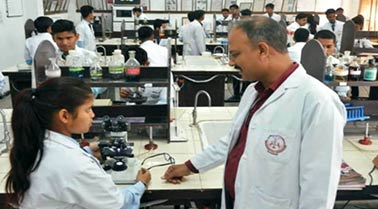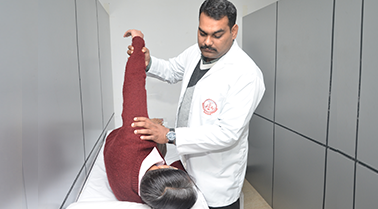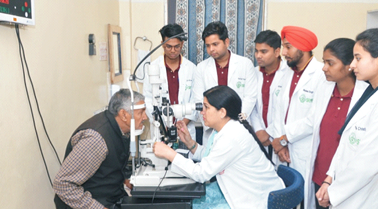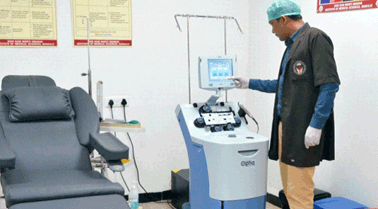 Master of Science in Medical Laboratory Science (MMLS)
Master of Science in Medical Laboratory Science (MMLS)
The M.Sc. in Medical Laboratory Technology is an advanced course designed with specialized classes and a focus on the practical learning of the student. It is an advanced discipline of science which deals with the analysis, cure and prevention of disease through various laboratory tests. Proficiently supervise and perform full range of clinically pathology laboratory tests. Manage information to enable effective, timely, accurate and cost-effective reporting of laboratory generated information. To teach under graduate students and develop/guide research projects and faculty development in Medical Laboratory Science.

Expectation from the future post graduate is in providing patient care, teaching and research. After completion of the course the student should be able to supervise/perform routine clinical pathology laboratory testing. Communicate with other members of health team, customers and patients in an effective manner. Process information and ensure quality control is an appropriate to routine laboratory. Train students in routine/special laboratory procedure and upgrade knowledge and skills in a clinical healthcare scenario. Students should be capable of supervise/guide the staff working on automated machine and capable of teaching, proposing/executing research project. Students after their successful completion of M.Sc in MLT may work as Lab Supervisor, Lab Manager, Instructor/tutor, Lab Analyst, Lab Technologist, Research Assistant etc.
 Master Of Science In Operation Theatre Technology (MOTT)
Master Of Science In Operation Theatre Technology (MOTT)
OT Technologists in the field of paramedical courses assist anesthesiologists and the surgical team during the preoperative period and provide support to patients in the PACU. They play an important role in the advance preparation of equipment necessary for various anesthesia/surgical procedures and also oversee all the work and management of the OT, which includes managing the patients in and out of the operation theatre (including PACU), caring for and maintaining all the OT equipment, as well as managing the staff and proper documentation.
CAREER PATH
Holders of the above degree in postgraduate programs have immense scope to work as assistants in operation theatres in both India and abroad, in corporate hospitals, medical colleges, and nursing homes. They can also pursue employment in the teaching profession, both in India and abroad. Employment can be obtained after completion of the course:
- Operation theatre managers, Technical Officer, Technical assistant.
- Lecturer in universities in India and abroad.
- Anesthesia /OT technologist in hospitals in India and abroad.
 Master Of Science In Medical Radiology & Imaging Technology (MMRIT)
Master Of Science In Medical Radiology & Imaging Technology (MMRIT)
M.Sc. in Medical Radio Imaging Techniques is a full-time 2-year post-graduate program in the field of paramedical courses, designed to familiarize individuals with the advanced principles of operations of radio imaging equipment and procedures. This course is recognized by Atal Bihari Vajphajee Vishwavidhyalaya (ABVV), a state university. MRIT is constantly evolving and offers a rewarding career in healthcare and diagnostic treatment. Personnel actively engage in academic work and quality assurance of various radiological modalities, and they can also work as a radiation safety officer (RSO) in the radiology department of hospitals after completing M.Sc. in radio imaging techniques.
 Master of Physiotherapy (MPT)
Master of Physiotherapy (MPT)
Master of Physiotherapy program aims to prepare postgraduate students towards his/her professional autonomy and inculcate the concept of research and evidence-based practice. The program also aims to incorporate the concept of management in Physiotherapy and experience in clinical training.
Offering the Following Specializations:
- MPT in Neurology
- MPT in Orthopedics
- MPT in Sports

SRMS consists of a team of dynamic physiotherapists, dedicated to achieve unique goals in the field of Physiotherapy & Rehabilitation. are competent to offer physiotherapy care to multitude of patients at various departments.
Program Highlights in the field of paramedical courses
As a Physiotherapy student in the field of paramedical courses, you will learn from leading academics how to use a range of drug-free techniques to treat and prevent injuries, as well as promote healthy living. In addition to the sports side of Physiotherapy, graduates also practice in roles that contribute significantly to the wider community, such as the management of neurological conditions, movement disorders, rehabilitation, and recovery.
During the two-year degree in paramedical courses, you will explore introductory and advanced Musculoskeletal, Neurological, and Sports Physiotherapy, applied to patients across the lifespan. The curriculum incorporates biomechanics, occupational health, and community health in various units of study, and it embeds evidence-based practice and professional practice throughout.
Scope in paramedical courses
A career in physiotherapy can lead to a variety of interesting and challenging jobs in the healthcare system. Physiotherapists get specializations in areas such as sports, gynecology, pediatrics, geriatrics, neurology, cardiorespiratory, and orthopedics. It can also obtain a doctorate degree and become involved in research. That demonstrate a high level of skill, knowledge, and competence in their work may find many opportunities for growth, such as moving into supervisory or management positions, teaching positions, or they may decide to open their own physiotherapy clinic or service.”
 Master of Optometry (MOPTOM)
Master of Optometry (MOPTOM)
A higher professional degree in Optometry offer specialist advice on eye care and provide timely diagnostic intervention. Training in Optometry also enables professionals to specialise in the fields of low vision, advanced contact lenses, binocular vision, vision therapy, rehabilitation, neuro optometric rehabilitation and behavioural optometry etc. This program offers students excellent advantage in terms of hands-on exposure and rigorous theoretical training. A career in Optometry offers personal growth, unlimited opportunity, respect in society, contribution to the community for improving healthcare, and as a result good quality of life, job flexibility and financial success.

Optometrists usually work in eye hospitals, clinics and optical outlets or with multinational vision care companies. You may also specialise in particular types of vision disorders. After gaining experience in a private establishment or with a lens manufacturer, you can start your own practice.
Following are the roles that graduates can explore:
- Vision Therapist
- Behavioural Optometry Specialist
- Neuro-optometric Rehabilitation Professional
- Low Vision Specialist
- Orthoptist
- Contact Lens Specialist
Program Highlights
Masters in Optometry is a recommended program to the graduates in Optometry to enhance their knowledge in Vision Science, Clinical diagnosis & Optometric Management Practices. This course trains participants for professional specialisation in various areas of Optometry, like Contact Lenses, Pediatric Optometry, Low Vision, Practice Management etc.
Further, they will be able to conduct eye tests to examine the patient’s vision, prescribe eyeglasses & contact lenses, provided vision therapy & low vision rehabilitation, if required. The course has a mixed academic focus – it trains students for both specialised professional practice and research.
At SRMS, the program offers students great advantages in terms of hands-on exposure and rigorous theoretical and Clinical training.
Scope
A career as an optometrist can be very fulfilling as it provides a wide scope for employment. Optometrist can:
- Practice independently or have a joint practice along with an ophthalmologist.
- Become an educator or head of an educational institute
- Be a member of professional services in corporate organization
- Become a researcher in basic science and clinical research
- Join the central or state government hospitals and health centers
 Bachelor Of Science In Medical Laboratory Science (BMLS)
Bachelor Of Science In Medical Laboratory Science (BMLS)
SRMS IPS offers a Diploma in Dialysis Technician course providing an absolute focus on skill development. This special paramedical courses trains students to become skilled dialysis technicians, capable of handling haemodialysis and peritoneal dialysis. The course also includes training on the preparation of dialysis fluids. As well as the washing and storage of dialyzers for reuse. A diploma or certificate holder is capable of setting up and operating the dialysis machines, mixing dialysate according to the formula, and priming the dialyzer with saline or heparinized solution to prepare the machine.
Our students are trained to prepare a patient both physically and psychologically for the dialysis procedure by recording patient details prior to dialysis, explaining the procedure and functioning. the machine, providing reassurance to anxious patients, and then beginning with the physical care needed. Our dialysis training includes running safety checks for the machine settings, particularly the pressures, conductivity, and temperature. Furthermore, students are trained to be vigilant regarding the patient’s reactions and monitor venous. Arterial pressures, fluid removal, and replacement as achieved during the dialysis procedure.

The course trains students in aspects such as learning about various diseases, their detection and diagnosis. This course also teaches techniques such as operating electronic and electrical lab equipment, patient record keeping, and progress monitoring.
Scope:
Depending upon training and qualification, MLT professionals may work as technologists at medical laboratories.One may start off by working as technician. After gaining work experience, individuals can advance through the ranks and even become lab managers. Government hospitals, private clinics, and nursing homes that have medical labs recruit MLT professionals, who actively work in medical labs. Independent commercial medical labs and pathological labs also recruit MLT professionals.
 Bachelor Of Science In Operation Theatre Technology (BOTT)
Bachelor Of Science In Operation Theatre Technology (BOTT)
A professional operation theatre technician trained to assist Doctors or Surgeons during surgery General function of an OT technician under the instructions of Doctor/surgeons during surgery. They look after all the work and management of the operation theatre and they look the drugs the required for surgery, anesthetic gases drapes and all the linen and their sterilization.

ICU, CCU and Emergency departments are common work places of an OT Technician. They are capable of taking care of basic patient monitoring activities .They work as reliable members of health care teams under the guidance and supervision of nursing anesthetic and surgical staff during surgery.
This is a job oriented paramedical area and gives job opportunities. Due to the fast expanding medical care facilities in the government and private sector, there is lot of scope for operation theatre assistants and technicians After successful completion of course candidate are eligible for challenging career in the field of OT Technician, Anesthesia Technician, CSSD Technician Etc. In government, Semi-Government, Private Ltd. Hospital, Institute, nursing homes both in India and abroad.
 Bachelor Of Physiotherapy (BPT)
Bachelor Of Physiotherapy (BPT)
Physiotherapy is an autonomous health profession that is primarily directed towards the prevention or alleviation of movement dysfunction in people. It is concerned with the remediation of impairment, and promotion of mobility, functional ability.

In the field of paramedical courses, the practice of physiotherapy is dedicated to movement sciences and focuses on the function of body systems. Physiotherapy assesses, treats, and prevents human and animal movement disorders, restoring normal function or minimizing dysfunction and pain in adults and children with physical impairment, enabling them to achieve the highest possible level of independence in their lives. It aims to prevent recurring injuries and disability in the workplace, at home, or during recreational activities and promotes community health for all age groups. Physiotherapists use skilled evaluation, skilled hands-on therapy such as mobilization, manipulation, massage; individually designed exercise programmers, relaxation techniques, sophisticated equipment, hydrotherapy and biofeedback, specialized electrotherapy equipment, heat, ice, and traction to relieve pain and assist healing and recovery, suitable walking aids, splints and appliances, and patient education.
Scope
A career in physiotherapy can lead to a variety of interesting and challenging jobs in the health care system. Physiotherapists get specializations in the areas such as sports, gynecology, pediatrics, geriatrics, neurology, cardio respiratory, and orthopedics. can also obtain a doctorate degree and become involved in research. Physiotherapists that demonstrate a high level of skill, knowledge and competence in their work may find many opportunities for growth, such as moving into supervisory or management positions, teaching positions, or they may decide to open their own physiotherapy clinic or service.
Job Roles:
Physiotherapists work with patients with physical difficulties that may be a result of illness, injury, disability or aging. A physiotherapist will need to: work with patients to identify and treat their physical problems. Develop treatment programmers. Encourage exercise and movement by use of techniques. Assist patients following surgery, injury, accident and strokes, enhancing tolerance in exercise and daily activities, educating about the condition and therapy program.
 Bachelor Of Optometry (BOPTOM)
Bachelor Of Optometry (BOPTOM)
Optometry is an autonomous, educated, and regulated (licensed/registered) healthcare profession, and optometrists serve as the primary healthcare practitioners of the eye and visual system. They provide comprehensive eye and vision care, which includes refraction and dispensing, detection/diagnosis, and management of eye diseases, as well as the rehabilitation of visual system conditions.

As primary eye care practitioners, optometrist have a vital role in detecting potentially serious eye disease such as cataract, glaucoma and age –related maculopathy, and general health conditions such as hypertension and diabetes .
An optometrist is a health service provider who is involved exclusively with vision problems, recording and measuring vision. Testing patients depth and color perception, and testing patients ability to coordinate and focus their eyes and also prescribe contact lenses and glasses and eye exercises limited treatments of some eye conditions.
Scope
A career as an optometrist can be very fulfilling as it provides a wide scope for employment. Optometrist can:
 Bachelor Of Science In Medical Radiology & Imaging Technology(BMRIT)
Bachelor Of Science In Medical Radiology & Imaging Technology(BMRIT)
A radiographer produces radiography of patients with the help of X-ray to find the exact medical condition of the patient. In addition with X-ray, a radiographer also considers X-rays, CT scans, MRI for producing radiography. The radiology field is broadly divided into two areas, namely, diagnostic radiology and interventional radiology.
Diagnostic Radiology is the specialization of medicine that uses the images of X-Ray and other imaging techniques to diagnose the disease and injury of patient.

Interventional Radiology is the another medical specialty that also uses imaging techniques (X-ray, CT, MRI and PET) for direction. Patients can be treated and diagnosed using minimally invasive procedures.
Scope
The need of educated and professional radiology technologists in hospitals, military hospital, clinics, and physicians’ offices are increasing continuously. The field of radiography will continue to show higher than average job growth into the future. After completing your degree in this field you will become Radiology Technologists/ Radiographer, MRI Technician, CT Tech/ CAT Scan Technologist/ CT Scan Technologist/RSO.
 Diploma in Blood Transfusion Technician (DBTT)
Diploma in Blood Transfusion Technician (DBTT)
Blood Transfusion services are a vital part of the modern healthcare system, without which efficient medical care is impossible. The aim of blood transfusion services is to provide effective blood and blood components, which are as safe as possible and adequate to meet the patient’s needs.
To prepare a blood transfusion technician, who is able to carry out the complete process of blood donation and process the donated blood (including blood grouping, TTI screening, separating it into blood components, and ensuring. The storage and quality control of stored blood), as well as issuing the stored blood/components, understanding the laws and rules related to transfusion medicine, performing all related paperwork and record-keeping, and dealing with common adverse reactions during donation and transfusion

Depending upon training, diploma holders may work as technicians at a Blood Bank. After gaining work experience, one may rise through the posts and even become a senior Blood Bank technician. Government hospitals and private blood banks are known to recruit Blood Bank technicians. These skills can be acquired through specialized paramedical courses.
 Diploma In Dialysis Technician (DDT)
Diploma In Dialysis Technician (DDT)
SRMS IPS offers a Diploma in Dialysis Technician course providing an absolute focus on skill development. This special paramedical courses trains students to become skilled dialysis technicians, capable of handling haemodialysis and peritoneal dialysis. The course also includes training on the preparation of dialysis fluids. As well as the washing and storage of dialyzers for reuse. A diploma or certificate holder is capable of setting up and operating. The dialysis machines, mixing dialysate according to the formula, and priming. The dialyzer with saline or heparinized solution to prepare the machine.
Our students are trained to prepare a patient both physically and psychologically for the dialysis procedure by recording patient details prior to dialysis. Explaining the procedure and functioning of the machine, providing reassurance. To anxious patients, and then beginning with the physical care needed. Our dialysis training includes running safety checks for the machine settings, particularly the pressures, conductivity, and temperature. Furthermore, students are trained to be vigilant regarding the patient’s reactions and monitor venous. Arterial pressures, fluid removal, and replacement as achieved during the dialysis procedure.
JOB/WORK LOCATION
- • Multi-speciality hospitals
- • Dialysis centres
DESCRIPTION
- • Operates dialysis machines under supervision of doctors.
- • Performs dialysis on patients with severe kidney disease.
- • Responsible for the operation, cleaning, maintenance, and sterilisation of the dialysis machines.


